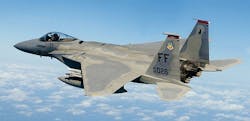Air Force eyes next-generation tactical data links gateway for jet fighter communications
Officials of the Air Force Life Cycle Management Center at Hanscom Air Force Base, Mass., issued a sources-sought notice on Tuesday (TBD0001) for Increment II of the 5th to 4th Gen Gateway.
The second-increment system must enable fifth-generation fighters like the F-22 and F-35 to share a common battlespace picture over different tactical data link as the first increment does, but also must have an infrared search and track (IRST) sensor as a stealthy alternative to radar to scan the skies for enemy aircraft.
The second-increment system also must have a means for maintaining satellite communications (SATCOM) during air combat, as well as the ability to create a secure common tactical picture that blends information from the F-22's inflight data link (IFDL), the F-35's multi-function advanced data link (MADL), IRST sensors, National Technical Means (NTM), and legacy Link 16 that is accessible to aircraft using Link 16.
IFDL, MADL, and Link 16 refer to airborne information-distribution data links that enable combat aircraft to share sensor information in a common tactical picture.
Related: Situational awareness relies on data communications and networking
The legacy Link 16 is a U.S. and NATO military tactical data exchange network for aircraft, ships, ground forces, and smart munitions. In addition to creating a common tactical picture, Link 16 enables military forces working together to share text messages, imagery, and digital voice communications.
Aircraft that use Link 16 include the F-15, F-16, Eurofighter, F/A-18, and Mirage 2000 jet fighters. One problem with Link 16, however, is its RF signature, which the enemy can use to detect and track Link 16-equipped aircraft.
The Air Force F-22 Raptor jet fighter uses IFDL, which provides a low-probability-of-detection and low-probability-of-intercept inflight data link. The F-35, on the other hand, uses MADL, a fast switching narrow directional communications data link. The problem today is that Link-16, IFDL, and MADL are not compatible.
Air Force experts have tried to bridge the compatibility gap between the three data links with the first increment of the 5th to 4th Gen Gateway, which has been demonstrated by several contractors, including Boeing, Lockheed Martin, and Northrop Grumman.
In addition to an IRST, Air Force experts want the second-increment 5th to 4th Gen Gateway to have beyond-line-of-sight access to national data service providers, and a multi-level security track correlation and data fusion processor, connected to several different data domains.
Related: Navy reaches out to industry for new technologies to enhance shipboard sensor networking
The new system should be able to provide a radio solution guaranteeing interoperability with F-22 over the IFDL data link, and F-35 over the MADL data link, as well as support for IFDL Block 3.1, Block 3.2A, Block 3.2B, and Widenet Reuse; current and future MADL releases; radio interoperability between F-22 and F-35 aircraft; configuration management of the IFDL and MADL waveforms; and meet DD Form 254 requirements.
The Air Force would like to demonstrate the next-generation 5th to 4th Gen Gateway aboard an F-15C jet fighter.
Companies interested should email white papers no longer than 10 pages by 8 April 2016 to the Air Force's Lori-Ann Dionne at [email protected] and Gregory Bailey at [email protected].
For questions or concerns contact Lori-Ann Dionne by email at [email protected], or by phone at 781-225-4189. Also contact Gregory Bailey by email at [email protected], or by phone at 781-225-5546.
More information is online at https://www.fbo.gov/spg/USAF/AFMC/ESC/TBD0001/listing.html.
